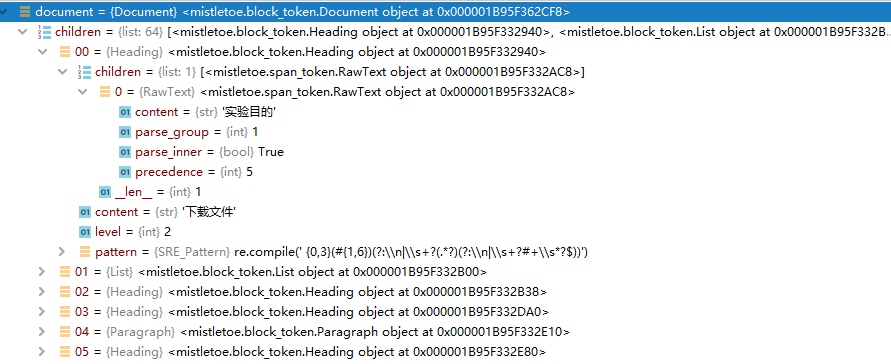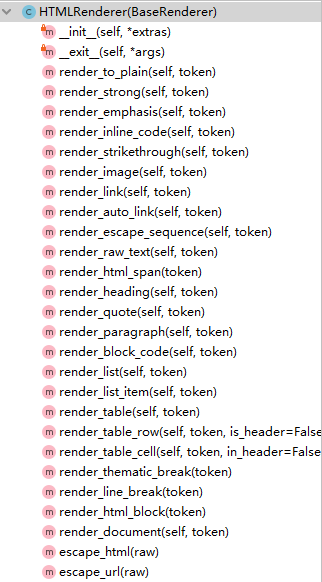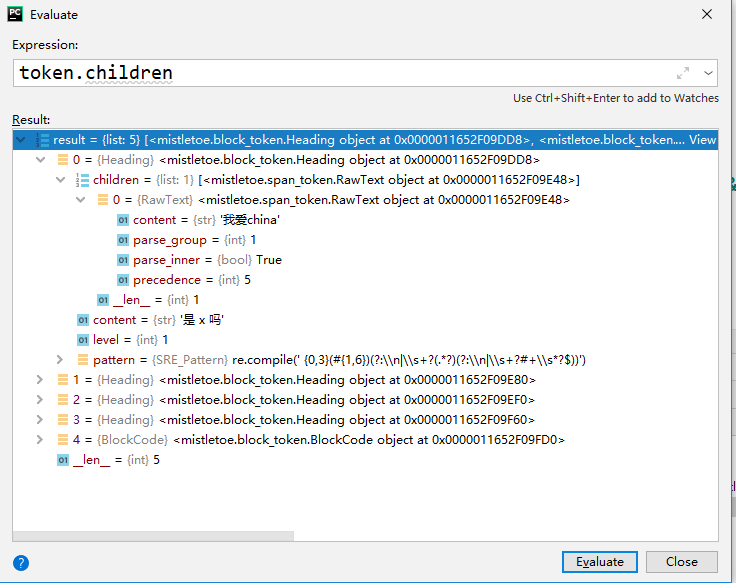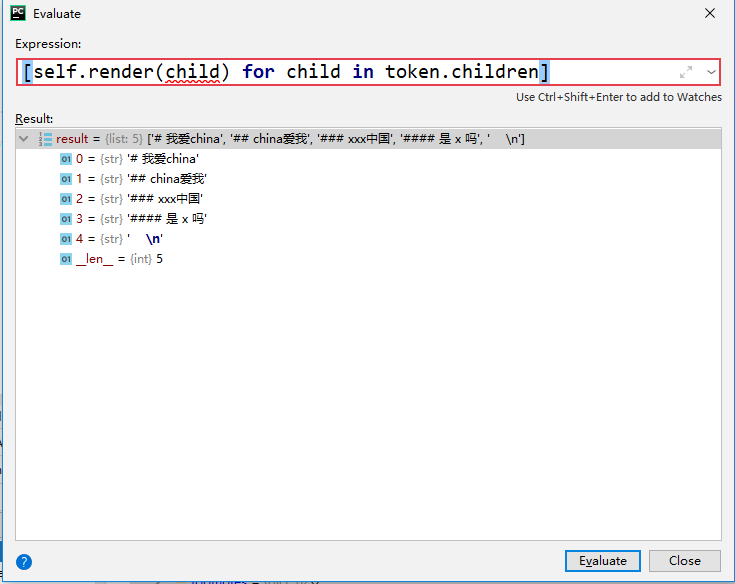文章目录
mistletoe 安装
pip3 install mistletoe
mistletoe 使用
with open('D:/GZUniversity/Project/prettifyMarkdown/example.md', 'r', encoding='utf-8') as fin:
rendered = mistletoe.markdown(fin)
mistletoe 入口
# iterable:由 open()获取的文件句柄
# renderer:具体的渲染类
def markdown(iterable, renderer=HTMLRenderer):
"""
Output HTML with default settings.
Enables inline and block-level HTML tags.
"""
with renderer() as renderer:
return renderer.render(Document(iterable))
mistletoe 源码解析
document
Document 是包 mistletoe.block_token 中的工具类,其作用是将 .md 文件生成抽象语法树,语法树如下图所示:
from mistletoe.block_token import Document
from targetRender import targetRender
with open('D:/GZUniversity/Project/prettifyMarkdown/example.md', 'r', encoding='utf-8') as fin:
# 如下图所示,是源文件生成的抽象语法树
document = Document(fin)
targetRender().render(document)
其中,一个 Children 代表 Markdown 文件中的一个基本组成单元,如标题、图片、代码块等。
解析为抽象语法树之后,将其抽象语法树交由 Renderer 处理。
以下为 Markdown 中各种元素对应的类,如 class Heading(BlockToken) 对应 Markdown 中的标题。
Document
文档本生,包含所有的元素。可以理解为 根节点。
class Document(BlockToken):
"""
Document token.
"""
def __init__(self, lines):
if isinstance(lines, str):
lines = lines.splitlines(keepends=True)
lines = [line if line.endswith('\n') else '{}\n'.format(line) for line in lines]
self.footnotes = {}
global _root_node
_root_node = self
span_token._root_node = self
self.children = tokenize(lines)
span_token._root_node = None
_root_node = None
Heading
class Heading(BlockToken):
"""
Heading token. (["### some heading ###\\n"])
Boundary between span-level and block-level tokens.
Attributes:
level (int): heading level.
children (list): inner tokens.
"""
pattern = re.compile(r' {0,3}(#{1,6})(?:\n|\s+?(.*?)(?:\n|\s+?#+\s*?$))')
level = 0
content = ''
def __init__(self, match):
self.level, content = match
super().__init__(content, span_token.tokenize_inner)
@classmethod
def start(cls, line):
match_obj = cls.pattern.match(line)
if match_obj is None:
return False
cls.level = len(match_obj.group(1))
cls.content = (match_obj.group(2) or '').strip()
if set(cls.content) == {'#'}:
cls.content = ''
return True
@classmethod
def read(cls, lines):
next(lines)
return cls.level, cls.content
SetextHeading
class SetextHeading(BlockToken):
"""
Setext headings.
Not included in the parsing process, but called by Paragraph.__new__.
"""
def __init__(self, lines):
self.level = 1 if lines.pop().lstrip().startswith('=') else 2
content = '\n'.join([line.strip() for line in lines])
super().__init__(content, span_token.tokenize_inner)
@classmethod
def start(cls, line):
raise NotImplementedError()
@classmethod
def read(cls, lines):
raise NotImplementedError()
Quote
class Quote(BlockToken):
"""
Quote token. (["> # heading\\n", "> paragraph\\n"])
"""
def __init__(self, parse_buffer):
# span-level tokenizing happens here.
self.children = tokenizer.make_tokens(parse_buffer)
@staticmethod
def start(line):
stripped = line.lstrip(' ')
if len(line) - len(stripped) > 3:
return False
return stripped.startswith('>')
@classmethod
def read(cls, lines):
# first line
line = cls.convert_leading_tabs(next(lines).lstrip()).split('>', 1)[1]
if len(line) > 0 and line[0] == ' ':
line = line[1:]
line_buffer = [line]
# set booleans
in_code_fence = CodeFence.start(line)
in_block_code = BlockCode.start(line)
blank_line = line.strip() == ''
# loop
next_line = lines.peek()
while (next_line is not None
and next_line.strip() != ''
and not Heading.start(next_line)
and not CodeFence.start(next_line)
and not ThematicBreak.start(next_line)
and not List.start(next_line)):
stripped = cls.convert_leading_tabs(next_line.lstrip())
prepend = 0
if stripped[0] == '>':
# has leader, not lazy continuation
prepend += 1
if stripped[1] == ' ':
prepend += 1
stripped = stripped[prepend:]
in_code_fence = CodeFence.start(stripped)
in_block_code = BlockCode.start(stripped)
blank_line = stripped.strip() == ''
line_buffer.append(stripped)
elif in_code_fence or in_block_code or blank_line:
# not paragraph continuation text
break
else:
# lazy continuation, preserve whitespace
line_buffer.append(next_line)
next(lines)
next_line = lines.peek()
# block level tokens are parsed here, so that footnotes
# in quotes can be recognized before span-level tokenizing.
Paragraph.parse_setext = False
parse_buffer = tokenizer.tokenize_block(line_buffer, _token_types)
Paragraph.parse_setext = True
return parse_buffer
@staticmethod
def convert_leading_tabs(string):
string = string.replace('>\t', ' ', 1)
count = 0
for i, c in enumerate(string):
if c == '\t':
count += 4
elif c == ' ':
count += 1
else:
break
if i == 0:
return string
return '>' + ' ' * count + string[i:]
Paragraph
class Paragraph(BlockToken):
"""
Paragraph token. (["some\\n", "continuous\\n", "lines\\n"])
Boundary between span-level and block-level tokens.
"""
setext_pattern = re.compile(r' {0,3}(=|-)+ *$')
parse_setext = True # can be disabled by Quote
def __new__(cls, lines):
if not isinstance(lines, list):
# setext heading token, return directly
return lines
return super().__new__(cls)
def __init__(self, lines):
content = ''.join([line.lstrip() for line in lines]).strip()
super().__init__(content, span_token.tokenize_inner)
@staticmethod
def start(line):
return line.strip() != ''
@classmethod
def read(cls, lines):
line_buffer = [next(lines)]
next_line = lines.peek()
while (next_line is not None
and next_line.strip() != ''
and not Heading.start(next_line)
and not CodeFence.start(next_line)
and not Quote.start(next_line)):
# check if next_line starts List
list_pair = ListItem.parse_marker(next_line)
if (len(next_line) - len(next_line.lstrip()) < 4
and list_pair is not None):
prepend, leader = list_pair
# non-empty list item
if next_line[:prepend].endswith(' '):
# unordered list, or ordered list starting from 1
if not leader[:-1].isdigit() or leader[:-1] == '1':
break
# check if next_line starts HTMLBlock other than type 7
html_block = HTMLBlock.start(next_line)
if html_block and html_block != 7:
break
# check if we see a setext underline
if cls.parse_setext and cls.is_setext_heading(next_line):
line_buffer.append(next(lines))
return SetextHeading(line_buffer)
# check if we have a ThematicBreak (has to be after setext)
if ThematicBreak.start(next_line):
break
# no other tokens, we're good
line_buffer.append(next(lines))
next_line = lines.peek()
return line_buffer
@classmethod
def is_setext_heading(cls, line):
return cls.setext_pattern.match(line)
BlockCode
class BlockCode(BlockToken):
"""
Indented code.
Attributes:
children (list): contains a single span_token.RawText token.
language (str): always the empty string.
"""
def __init__(self, lines):
self.language = ''
self.children = (span_token.RawText(''.join(lines).strip('\n')+'\n'),)
@staticmethod
def start(line):
return line.replace('\t', ' ', 1).startswith(' ')
@classmethod
def read(cls, lines):
line_buffer = []
for line in lines:
if line.strip() == '':
line_buffer.append(line.lstrip(' ') if len(line) < 5 else line[4:])
continue
if not line.replace('\t', ' ', 1).startswith(' '):
lines.backstep()
break
line_buffer.append(cls.strip(line))
return line_buffer
@staticmethod
def strip(string):
count = 0
for i, c in enumerate(string):
if c == '\t':
return string[i+1:]
elif c == ' ':
count += 1
else:
break
if count == 4:
return string[i+1:]
return string
CodeFence
class CodeFence(BlockToken):
"""
Code fence. (["```sh\\n", "rm -rf /", ..., "```"])
Boundary between span-level and block-level tokens.
Attributes:
children (list): contains a single span_token.RawText token.
language (str): language of code block (default to empty).
"""
pattern = re.compile(r'( {0,3})((?:`|~){3,}) *(\S*)')
_open_info = None
def __init__(self, match):
lines, open_info = match
self.language = span_token.EscapeSequence.strip(open_info[2])
self.children = (span_token.RawText(''.join(lines)),)
@classmethod
def start(cls, line):
match_obj = cls.pattern.match(line)
if not match_obj:
return False
prepend, leader, lang = match_obj.groups()
if leader[0] in lang or leader[0] in line[match_obj.end():]:
return False
cls._open_info = len(prepend), leader, lang
return True
@classmethod
def read(cls, lines):
next(lines)
line_buffer = []
for line in lines:
stripped_line = line.lstrip(' ')
diff = len(line) - len(stripped_line)
if (stripped_line.startswith(cls._open_info[1])
and len(stripped_line.split(maxsplit=1)) == 1
and diff < 4):
break
if diff > cls._open_info[0]:
stripped_line = ' ' * (diff - cls._open_info[0]) + stripped_line
line_buffer.append(stripped_line)
return line_buffer, cls._open_info
List
class List(BlockToken):
"""
List token.
Attributes:
children (list): a list of ListItem tokens.
loose (bool): whether the list is loose.
start (NoneType or int): None if unordered, starting number if ordered.
"""
pattern = re.compile(r' {0,3}(?:\d{0,9}[.)]|[+\-*])(?:[ \t]*$|[ \t]+)')
def __init__(self, matches):
self.children = [ListItem(*match) for match in matches]
self.loose = any(item.loose for item in self.children)
leader = self.children[0].leader
self.start = None
if len(leader) != 1:
self.start = int(leader[:-1])
@classmethod
def start(cls, line):
return cls.pattern.match(line)
@classmethod
def read(cls, lines):
leader = None
next_marker = None
matches = []
while True:
output, next_marker = ListItem.read(lines, next_marker)
item_leader = output[2]
if leader is None:
leader = item_leader
elif not cls.same_marker_type(leader, item_leader):
lines.reset()
break
matches.append(output)
if next_marker is None:
break
if matches:
# Only consider the last list item loose if there's more than one element
last_parse_buffer = matches[-1][0]
last_parse_buffer.loose = len(last_parse_buffer) > 1 and last_parse_buffer.loose
return matches
@staticmethod
def same_marker_type(leader, other):
if len(leader) == 1:
return leader == other
return leader[:-1].isdigit() and other[:-1].isdigit() and leader[-1] == other[-1]
ListItem
class ListItem(BlockToken):
"""
List items. Not included in the parsing process, but called by List.
"""
pattern = re.compile(r'\s*(\d{0,9}[.)]|[+\-*])(\s*$|\s+)')
def __init__(self, parse_buffer, prepend, leader):
self.leader = leader
self.prepend = prepend
self.children = tokenizer.make_tokens(parse_buffer)
self.loose = parse_buffer.loose
@staticmethod
def in_continuation(line, prepend):
return line.strip() == '' or len(line) - len(line.lstrip()) >= prepend
@staticmethod
def other_token(line):
return (Heading.start(line)
or Quote.start(line)
or CodeFence.start(line)
or ThematicBreak.start(line))
@classmethod
def parse_marker(cls, line):
"""
Returns a pair (prepend, leader) iff the line has a valid leader.
"""
match_obj = cls.pattern.match(line)
if match_obj is None:
return None # no valid leader
leader = match_obj.group(1)
content = match_obj.group(0).replace(leader+'\t', leader+' ', 1)
# reassign prepend and leader
prepend = len(content)
if prepend == len(line.rstrip('\n')):
prepend = match_obj.end(1) + 1
else:
spaces = match_obj.group(2)
if spaces.startswith('\t'):
spaces = spaces.replace('\t', ' ', 1)
spaces = spaces.replace('\t', ' ')
n_spaces = len(spaces)
if n_spaces > 4:
prepend = match_obj.end(1) + 1
return prepend, leader
@classmethod
def read(cls, lines, prev_marker=None):
next_marker = None
lines.anchor()
prepend = -1
leader = None
line_buffer = []
# first line
line = next(lines)
prepend, leader = prev_marker if prev_marker else cls.parse_marker(line)
line = line.replace(leader+'\t', leader+' ', 1).replace('\t', ' ')
empty_first_line = line[prepend:].strip() == ''
if not empty_first_line:
line_buffer.append(line[prepend:])
next_line = lines.peek()
if empty_first_line and next_line is not None and next_line.strip() == '':
parse_buffer = tokenizer.tokenize_block([next(lines)], _token_types)
next_line = lines.peek()
if next_line is not None:
marker_info = cls.parse_marker(next_line)
if marker_info is not None:
next_marker = marker_info
return (parse_buffer, prepend, leader), next_marker
# loop
newline = 0
while True:
# no more lines
if next_line is None:
# strip off newlines
if newline:
lines.backstep()
del line_buffer[-newline:]
break
next_line = next_line.replace('\t', ' ')
# not in continuation
if not cls.in_continuation(next_line, prepend):
# directly followed by another token
if cls.other_token(next_line):
if newline:
lines.backstep()
del line_buffer[-newline:]
break
# next_line is a new list item
marker_info = cls.parse_marker(next_line)
if marker_info is not None:
next_marker = marker_info
break
# not another item, has newlines -> not continuation
if newline:
lines.backstep()
del line_buffer[-newline:]
break
next(lines)
line = next_line
stripped = line.lstrip(' ')
diff = len(line) - len(stripped)
if diff > prepend:
stripped = ' ' * (diff - prepend) + stripped
line_buffer.append(stripped)
newline = newline + 1 if next_line.strip() == '' else 0
next_line = lines.peek()
# block-level tokens are parsed here, so that footnotes can be
# recognized before span-level parsing.
parse_buffer = tokenizer.tokenize_block(line_buffer, _token_types)
return (parse_buffer, prepend, leader), next_marker
Table
class Table(BlockToken):
"""
Table token.
Attributes:
has_header (bool): whether table has header row.
column_align (list): align options for each column (default to [None]).
children (list): inner tokens (TableRows).
"""
def __init__(self, lines):
if '---' in lines[1]:
self.column_align = [self.parse_align(column)
for column in self.split_delimiter(lines[1])]
self.header = TableRow(lines[0], self.column_align)
self.children = [TableRow(line, self.column_align) for line in lines[2:]]
else:
self.column_align = [None]
self.children = [TableRow(line) for line in lines]
@staticmethod
def split_delimiter(delimiter):
"""
Helper function; returns a list of align options.
Args:
delimiter (str): e.g.: "| :--- | :---: | ---: |\n"
Returns:
a list of align options (None, 0 or 1).
"""
return re.findall(r':?---+:?', delimiter)
@staticmethod
def parse_align(column):
"""
Helper function; returns align option from cell content.
Returns:
None if align = left;
0 if align = center;
1 if align = right.
"""
return (0 if column[0] == ':' else 1) if column[-1] == ':' else None
@staticmethod
def start(line):
return '|' in line
@staticmethod
def read(lines):
lines.anchor()
line_buffer = [next(lines)]
while lines.peek() is not None and '|' in lines.peek():
line_buffer.append(next(lines))
if len(line_buffer) < 2 or '---' not in line_buffer[1]:
lines.reset()
return None
return line_buffer
TableRow
class TableRow(BlockToken):
"""
Table row token.
Should only be called by Table.__init__().
"""
def __init__(self, line, row_align=None):
self.row_align = row_align or [None]
cells = filter(None, line.strip().split('|'))
self.children = [TableCell(cell.strip() if cell else '', align)
for cell, align in zip_longest(cells, self.row_align)]
class TableCell(BlockToken):
"""
Table cell token.
Boundary between span-level and block-level tokens.
Should only be called by TableRow.__init__().
Attributes:
align (bool): align option for current cell (default to None).
children (list): inner (span-)tokens.
"""
def __init__(self, content, align=None):
self.align = align
super().__init__(content, span_token.tokenize_inner)
Footnote
class Footnote(BlockToken):
"""
Footnote token.
The constructor returns None, because the footnote information
is stored in Footnote.read.
"""
label_pattern = re.compile(r'[ \n]{0,3}\[(.+?)\]', re.DOTALL)
def __new__(cls, _):
return None
@classmethod
def start(cls, line):
return line.lstrip().startswith('[')
@classmethod
def read(cls, lines):
line_buffer = []
next_line = lines.peek()
while next_line is not None and next_line.strip() != '':
line_buffer.append(next(lines))
next_line = lines.peek()
string = ''.join(line_buffer)
offset = 0
matches = []
while offset < len(string) - 1:
match_info = cls.match_reference(lines, string, offset)
if match_info is None:
break
offset, match = match_info
matches.append(match)
cls.append_footnotes(matches, _root_node)
return matches or None
@classmethod
def match_reference(cls, lines, string, offset):
match_info = cls.match_link_label(string, offset)
if not match_info:
cls.backtrack(lines, string, offset)
return None
_, label_end, label = match_info
if not follows(string, label_end-1, ':'):
cls.backtrack(lines, string, offset)
return None
match_info = cls.match_link_dest(string, label_end)
if not match_info:
cls.backtrack(lines, string, offset)
return None
_, dest_end, dest = match_info
match_info = cls.match_link_title(string, dest_end)
if not match_info:
cls.backtrack(lines, string, dest_end)
return None
_, title_end, title = match_info
return title_end, (label, dest, title)
@classmethod
def match_link_label(cls, string, offset):
start = -1
end = -1
escaped = False
for i, c in enumerate(string[offset:], start=offset):
if c == '\\' and not escaped:
escaped = True
elif c == '[' and not escaped:
if start == -1:
start = i
else:
return None
elif c == ']' and not escaped:
end = i
label = string[start+1:end]
if label.strip() != '':
return start, end+1, label
return None
elif escaped:
escaped = False
return None
@classmethod
def match_link_dest(cls, string, offset):
offset = shift_whitespace(string, offset+1)
if offset == len(string):
return None
if string[offset] == '<':
escaped = False
for i, c in enumerate(string[offset+1:], start=offset+1):
if c == '\\' and not escaped:
escaped = True
elif c == ' ' or c == '\n' or (c == '<' and not escaped):
return None
elif c == '>' and not escaped:
return offset, i+1, string[offset+1:i]
elif escaped:
escaped = False
return None
else:
escaped = False
count = 0
for i, c in enumerate(string[offset:], start=offset):
if c == '\\' and not escaped:
escaped = True
elif c in whitespace:
break
elif not escaped:
if c == '(':
count += 1
elif c == ')':
count -= 1
elif is_control_char(c):
return None
elif escaped:
escaped = False
if count != 0:
return None
return offset, i, string[offset:i]
@classmethod
def match_link_title(cls, string, offset):
new_offset = shift_whitespace(string, offset)
if (new_offset == len(string)
or '\n' in string[offset:new_offset]
and string[new_offset] == '['):
return offset, new_offset, ''
if string[new_offset] == '"':
closing = '"'
elif string[new_offset] == "'":
closing = "'"
elif string[new_offset] == '(':
closing = ')'
elif '\n' in string[offset:new_offset]:
return offset, offset, ''
else:
return None
offset = new_offset
escaped = False
for i, c in enumerate(string[offset+1:], start=offset+1):
if c == '\\' and not escaped:
escaped = True
elif c == closing and not escaped:
new_offset = shift_whitespace(string, i+1)
if '\n' not in string[i+1:new_offset]:
return None
return offset, new_offset, string[offset+1:i]
elif escaped:
escaped = False
return None
@staticmethod
def append_footnotes(matches, root):
for key, dest, title in matches:
key = normalize_label(key)
dest = span_token.EscapeSequence.strip(dest.strip())
title = span_token.EscapeSequence.strip(title)
if key not in root.footnotes:
root.footnotes[key] = dest, title
@staticmethod
def backtrack(lines, string, offset):
lines._index -= string[offset+1:].count('\n')
ThematicBreak
class ThematicBreak(BlockToken):
"""
Thematic break token (a.k.a. horizontal rule.)
"""
pattern = re.compile(r' {0,3}(?:([-_*])\s*?)(?:\1\s*?){2,}$')
def __init__(self, _):
pass
@classmethod
def start(cls, line):
return cls.pattern.match(line)
@staticmethod
def read(lines):
return [next(lines)]
HTMLRenderer
HTMLRenderer 类的方法如下。每个方法对应与 document 中的每一种类型。比如 document 中的 Heading 对应 HTMLRender 中的 方法 render_heading()
render
render 主要是根据输入 token 的类名,使用相应的 方法 处理 token。
def render(self, token):
"""
Grabs the class name from input token and finds its corresponding
render function.
Basically a janky way to do polymorphism.
Arguments:
token: whose __class__.__name__ is in self.render_map.
"""
return self.render_map[token.__class__.__name__](token)
其中,render_map 内容如下,使用 render_map[token.__class__.__name__](token)调用相关的方法。
self.render_map = {
'Strong': self.render_strong,
'Emphasis': self.render_emphasis,
'InlineCode': self.render_inline_code,
'RawText': self.render_raw_text,
'Strikethrough': self.render_strikethrough,
'Image': self.render_image,
'Link': self.render_link,
'AutoLink': self.render_auto_link,
'EscapeSequence': self.render_escape_sequence,
'Heading': self.render_heading,
'SetextHeading': self.render_heading,
'Quote': self.render_quote,
'Paragraph': self.render_paragraph,
'CodeFence': self.render_block_code,
'BlockCode': self.render_block_code,
'List': self.render_list,
'ListItem': self.render_list_item,
'Table': self.render_table,
'TableRow': self.render_table_row,
'TableCell': self.render_table_cell,
'ThematicBreak': self.render_thematic_break,
'LineBreak': self.render_line_break,
'Document': self.render_document,
}
render_document
render_document 处理 document 传入的抽象语法树。其功能如下:
- 遍历 document 中的 children (list 结构),并交由 render()处理。children 的结构如下:
- 用
\n连接选然后的文本。
def render_document(self, token):
self.footnotes.update(token.footnotes)
inner = '\n'.join([self.render(child) for child in token.children])
return '{}\n'.format(inner) if inner else ''
其中,[self.render(child) for child in token.children] 结果如下:
render_heading
render_heading() 根据抽象语法树中的字段 level 和 内容,将其渲染为 <h{level}>{inner}</h{level}> 。
def render_heading(self, token):
template = '<h{level}>{inner}</h{level}>'
inner = self.render_inner(token)
return template.format(level=token.level, inner=inner)
render_inner
递归 render child token,然后直接拼接
def render_inner(self, token):
"""
Recursively renders child tokens. Joins the rendered
strings with no space in between.
If newlines / spaces are needed between tokens, add them
in their respective templates, or override this function
in the renderer subclass, so that whitespace won't seem to
appear magically for anyone reading your program.
Arguments:
token: a branch node who has children attribute.
"""
return ''.join(map(self.render, token.children))
render_raw_text
将 markdown 中的 字符串 转换为 html 中的内容,比如空格、制表符等。
def render_raw_text(self, token):
return self.escape_html(token.content)
escape_html
@staticmethod
def escape_html(raw):
return html.escape(html.unescape(raw)).replace(''', "'")
escape
def escape(s, quote=True):
"""
Replace special characters "&", "<" and ">" to HTML-safe sequences.
If the optional flag quote is true (the default), the quotation mark
characters, both double quote (") and single quote (') characters are also
translated.
"""
s = s.replace("&", "&") # Must be done first!
s = s.replace("<", "<")
s = s.replace(">", ">")
if quote:
s = s.replace('"', """)
s = s.replace('\'', "'")
return s
今天的文章mistletoe 源码解析分享到此就结束了,感谢您的阅读。
版权声明:本文内容由互联网用户自发贡献,该文观点仅代表作者本人。本站仅提供信息存储空间服务,不拥有所有权,不承担相关法律责任。如发现本站有涉嫌侵权/违法违规的内容, 请发送邮件至 举报,一经查实,本站将立刻删除。
如需转载请保留出处:https://bianchenghao.cn/63276.html




